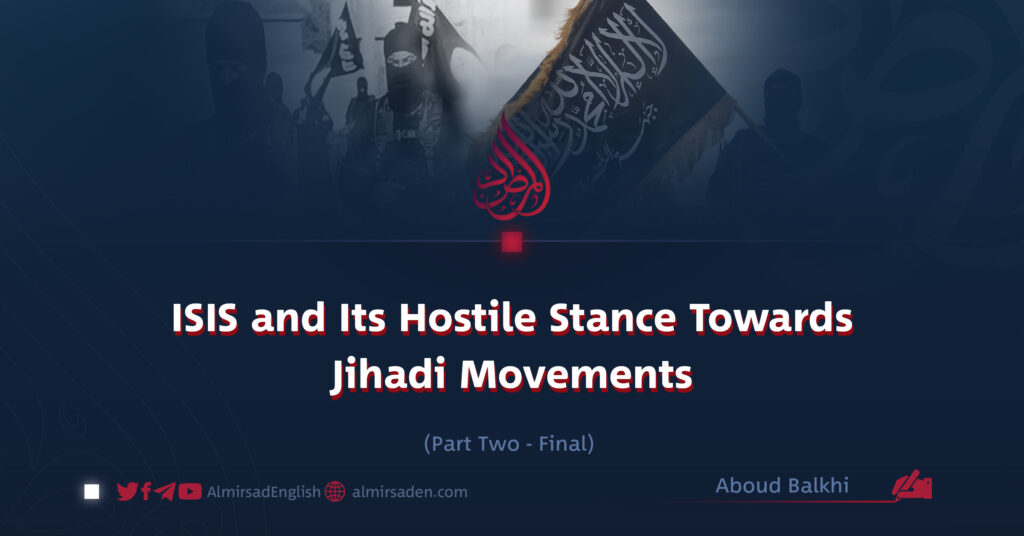Part Two – Final
Written by: Aboud Balkhi
ISIS’s Position on the Hamas Jihadi Movement:
ISIS classifies Hamas as a terrorist organization and a group that strays from the principles of Islam. It contends that Hamas’s administration does not conform to the comprehensive teachings of Islam. The opposition of ISIS towards Hamas can be traced back to approximately 2015 when ISIS militants executed several Hamas members in Gaza, accusing them of straying from the beliefs of “true Islam.”
In its propaganda communications, ISIS has censured Hamas, denoting it as “allies of non-believers.” According to ISIS, Hamas does not demonstrate dedication towards establishing a worldwide Islamic caliphate, and its approach to resolving the Palestinian dilemma opposes the objectives of ISIS. Nevertheless, Hamas persists in its active resistance against Jews for the liberation of Jerusalem and Palestinian territories.
ISIS’s Position on Tehrik-i-Taliban Pakistan (TTP):
The interaction between ISIS and Tehrik-i-Taliban Pakistan (TTP) is frequently characterized by conflict and enmity. ISIS perceives TTP as a rival faction contending for authority and influence in the Islamic realm, striving to disseminate its ideology and governance within the region.
ISIS portrays itself as a global caliphate and claims to aim for the establishment of an international Islamic government. In contrast, the TTP focuses on establishing an Islamic government within Pakistan, engaging in activities driven by national objectives. This fundamental ideological difference creates a significant conflict between the two groups, as ISIS considers its ideology the only truth and views other groups as weak and deviant.
ISIS’s Stance Against Al-Shabaab:
ISIS and Al-Shabaab hold competitive stances against one another. Al-Shabaab, an active group in Somalia and East Africa, is affiliated with Al-Qaeda. In contrast, ISIS positions itself as a proponent of a global caliphate, seeking to bring all Islamic groups under its control.
Al-Shabaab has pledged allegiance to Al-Qaeda and operates based on its principles and directives. Meanwhile, ISIS has a longstanding enmity with Al-Qaeda and aims to incorporate Al-Shabaab into its caliphate. ISIS has been trying to expand its influence in Africa and pressures Al-Shabaab to pledge allegiance. However, Al-Shabaab remains committed to its independence and stands firmly against ISIS’s influence and caliphate ambitions.
7. ISIS’s Position on Ansar al-Islam:
ISIS and Ansar al-Islam view each other as competitors. This rivalry intensified after ISIS declared its caliphate in Iraq and Syria in 2014. ISIS sought to bring all jihadi groups under the umbrella of its so-called caliphate. However, Ansar al-Islam rejected ISIS’s allegiance and control, asserting its independence.
ISIS sought to incorporate all jihadi groups into its fabricated caliphate, while Ansar al-Islam remained committed to independent activities and localized objectives, rejecting ISIS’s claim to legitimacy and asserting itself as an independent Islamic group.
ISIS adopts an extremely radical stance and employs brutal tactics in most of its operations, while Ansar al-Islam opposes such harsh and extreme measures, favoring a softer approach aligned with Islamic principles.
Conclusion:
ISIS is an external extremist group that perpetuates violence against Muslim individuals. They target civilians in places of worship, educational institutions, religious schools, marketplaces, and lodgings, with their financial backing and support emanating from entities such as Mossad, the CIA, and ISI.
